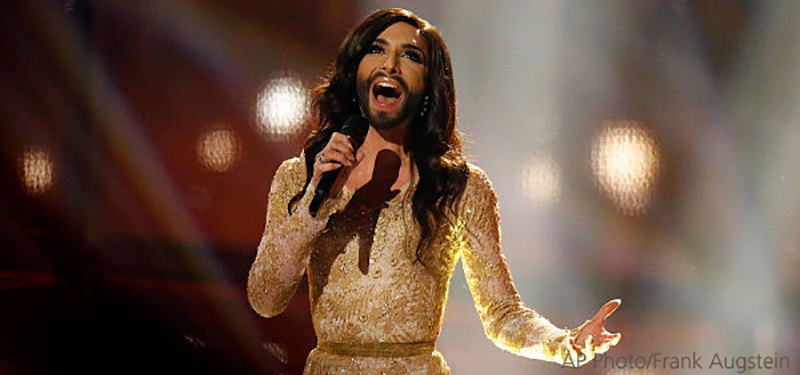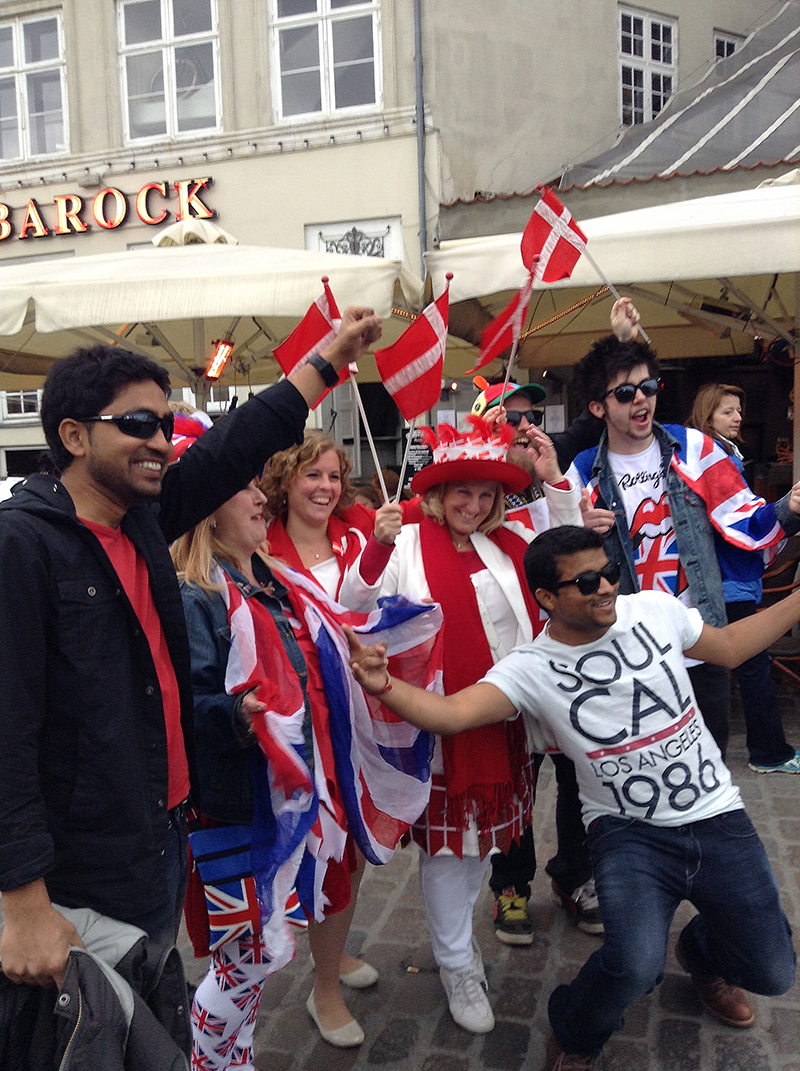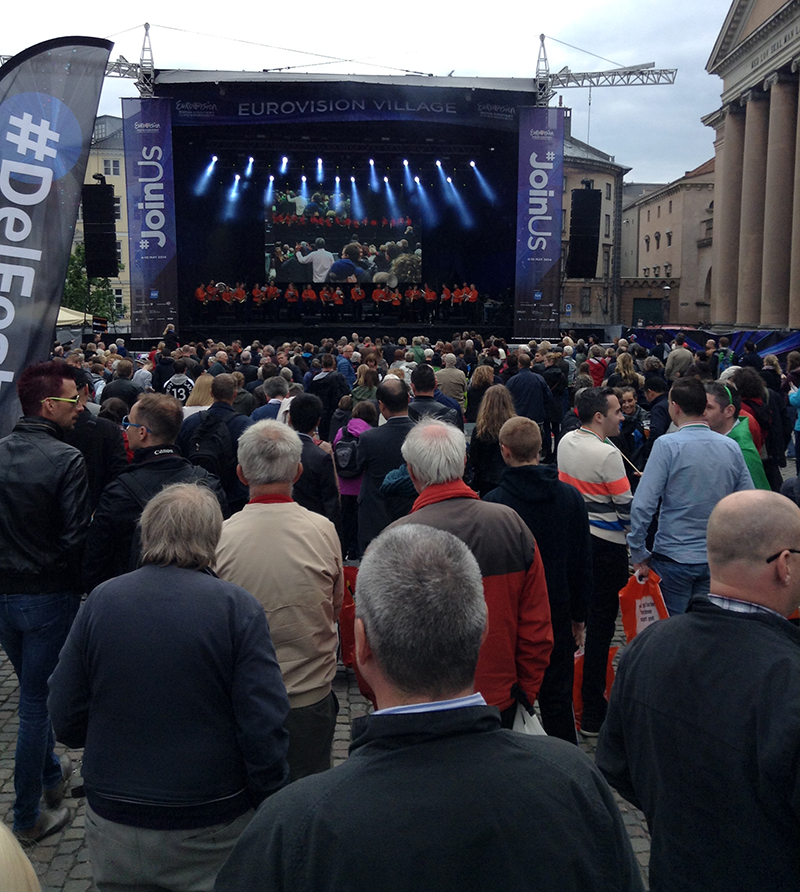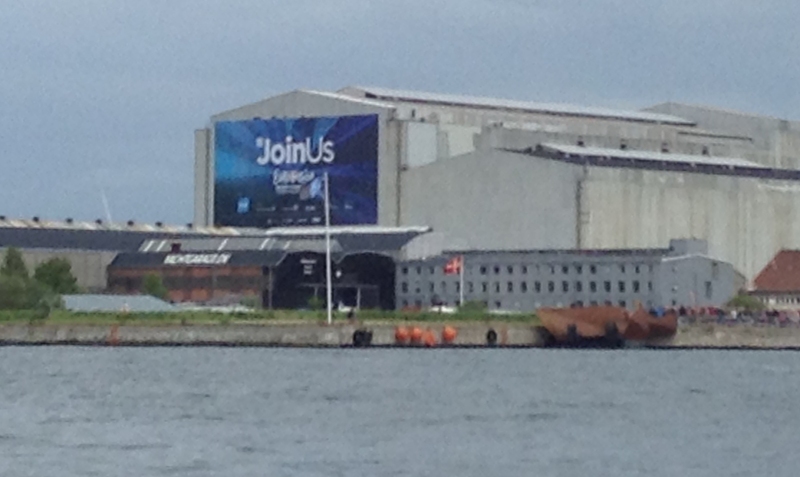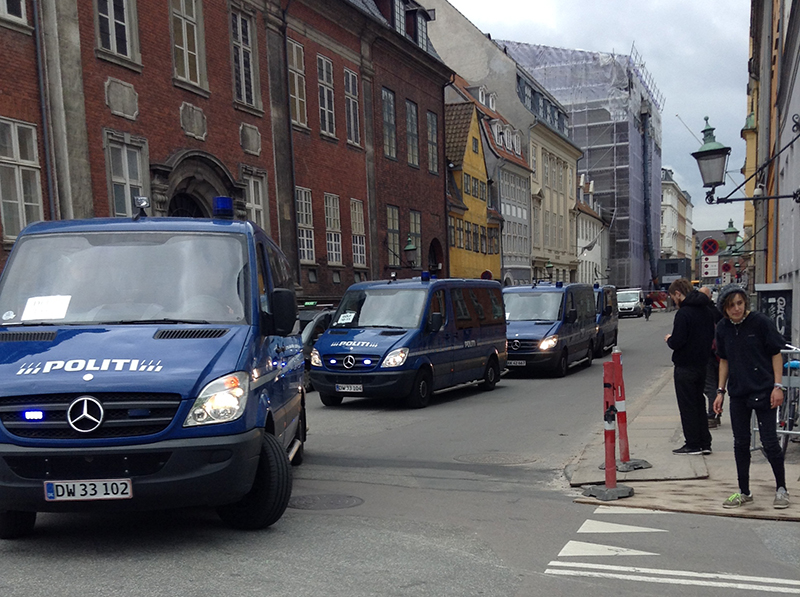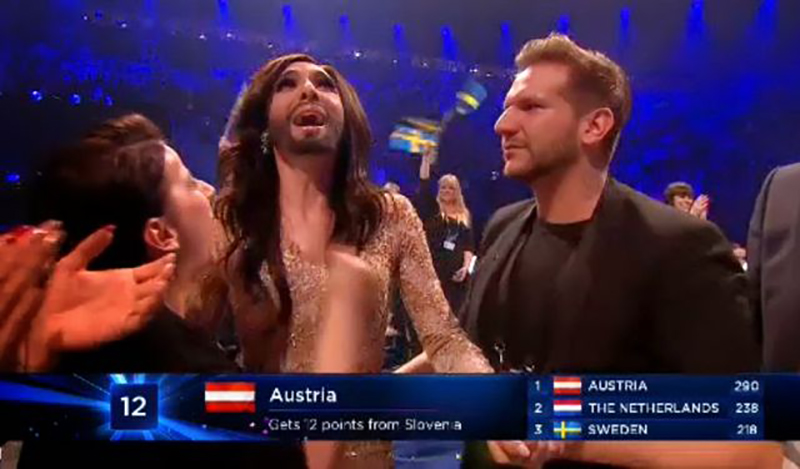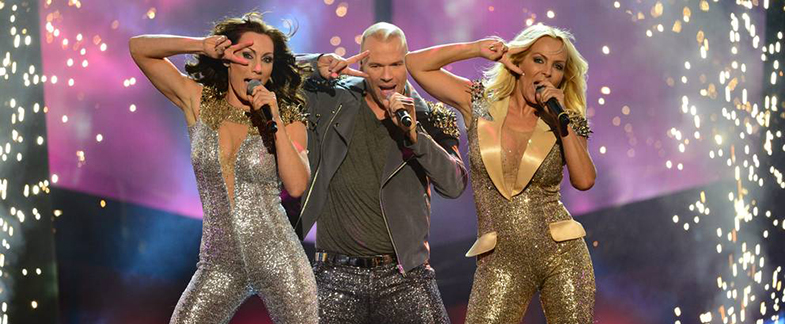Saturday’s Eurovision final in Copenhagen was a delightful, thrilling, and ultimately moving experience for viewers across Europe and especially those of us lucky enough to be in the city. Scott and I were there with my parents, and while our luck wasn’t quite good enough to get us into the live show, the giddy, dizzy excitement of fans milling in the streets and gathered at free outdoor concerts made Eurovision one of the most exhilarating city-wide parties I’ve experienced in a long time.
The open-air warmup shows featured musical acts of all kinds, and as we walked through squares and across canals, the rambunctious buzz of swing music was overtaken by strains of K-Pop-inspired karaoke, which in turn faded as we waded into mellow waves of electric folk. This year’s Eurovision organizers paid homage to the illustrious history of the event, and walking from stage to stage, I heard more renditions of “Waterloo” in one afternoon than I had in all my years put together.
The contest finals were held in a giant empty factory on an island that is now (and possibly forever) christened “Eurovision Island”. It was only open to ticket holders, but we got a pretty good look at it from a boat that took us out into the harbor. My photo of the venue is pretty blurry, because I didn’t bring my good camera with me out on the water. This decision proved both extremely foolish in light of all the canalside action I witnessed, and extremely wise in light of the sudden and total downpour that left everyone on the boat drenched and shivering.
Despite the cold, wet weather, it seemed like the whole city was out in the streets. Of course, the combination of large crowds and international media presence brought the dirtbags out of the woodwork as well. During afternoon coffee, we were startled by the sound of stomping boots as fifty-odd masked militants tore down Strøget dragging smoke canisters and shouting slogans. They were a right-wing fundamentalist group protesting religious diversity in Denmark, as we discovered later when we unwittingly walked into the vicinity their standoff against the police. At first, we weren’t sure what was happening as dozens of vans packed with officers in riot gear careened past us with sirens howling. A helicopter hovered right over our heads and every street was blockaded by officials who were not in the mood to talk about what was going on. It was unsettling, especially when we heard the crack of small arms fire a few blocks away.
It was a dramatic scene in which there were thankfully no casualties, and which was oddly given barely any mention in the news the next day. We eventually made it out of the chaos and were so relieved to be back in our warm, dry hotel that we settled into the bar to watch the show rather than venture back out. Little did we know that the collision of tolerance and bigotry that we’d witnessed that afternoon would prove to be a key theme in the narrative of the Eurovision finale itself.
The highlight of the evening was the sweeping victory of Austria’s Conchita Wurst for her performance of “Rise Like A Phoenix”. The story of how this champion rose to win it all is fascinating and moving: Conchita, affectionately nicknamed “Queen of Europe”, is the drag persona of Tom Neuwirth, a television personality and former boy band member. Her selection as Austria’s Eurovision delegate was contentious and triggered a deluge of condemnation from bigots near and far.
Both despite and in light of the controversy, support for Conchita grew as she moved through the semi-final rounds winning new fans at every turn. In the end, she earned high votes, not only from viewers, but also from juries in a majority of countries. As the results came in, her laughter and tears were lovely to behold, and her acceptance speech perfectly summed up the power and significance of the moment: “This night is dedicated to everyone who believes in a future of peace and freedom.”
That future moves a little closer whenever a cultural majority speaks out in support of the freedom to be different and to be one’s self. That for me, much more than any specific reading of what Conchita represents, is what made this television moment so remarkable. “First they laughed,” said BBC presenter and Eurovision commentator Graham Norton with a catch in his voice, “and then she just broke people’s hearts.”
Despite its famously lavish and kitschy musical performances, sophisticated camp is surprisingly rare at Eurovision. After the initial surprise of seeing Conchita appear in her beard and glimmering gown, I was stunned by the drama and emotion of her sighing, soaring voice, her statuesque grace and her sparkling stage presence. Her victory encore was nothing short of magical, and I had shivers as I watched her eyes shine in the spotlight.
Queen Conchita’s performance and story left everything else looking just a little dim in comparison, but a handful of other European countries came through with the ridiculousness I’d so eagerly anticipated. Poland, for example, gave us this tremendously amusing number:
According to a group of Danish and Azerbaijani fans who joined us to watch the show, this song is satirical in nature with lyrics that lampshade the objectification of women. Unfortunately, any feminist nuances were lost in translation for anyone who didn’t speak Polish, so the performance may not have had its intended effect.
Several countries made valiant attempts to out-diva Queen Conchita, and while no one was able to touch her, Ukraine’s Maria Yaremchuk made a very fine showing:
The unrest in Maria’s home country added a palpable layer of subtext to the event, and each time a vote for Ukraine was announced, the cheering of the crowd escalated into a frenzy. On the other hand, Russia’s Eurovision delegates bore the brunt of their country’s military actions and LGBT rights abuses, and were loudly booed at every turn.
As an outsider, I was riveted and fascinated to witness the ways in which Eurovision holds a mirror to the complexities of European culture and politics. It’s a glittering and surreal microcosm where bombastic musical numbers and television artifice play out the drama of longstanding rivalries and the friction between old ways and new ideas. Deeper insight into the phenomenon hasn’t in any way dampened my fervent appreciation for its delicious cheesiness, either. Instead, it leaves me even more enamored with Europe and its ability to face adversity and rise (yes, like a phoenix), transformed by spectacle and united by music.
